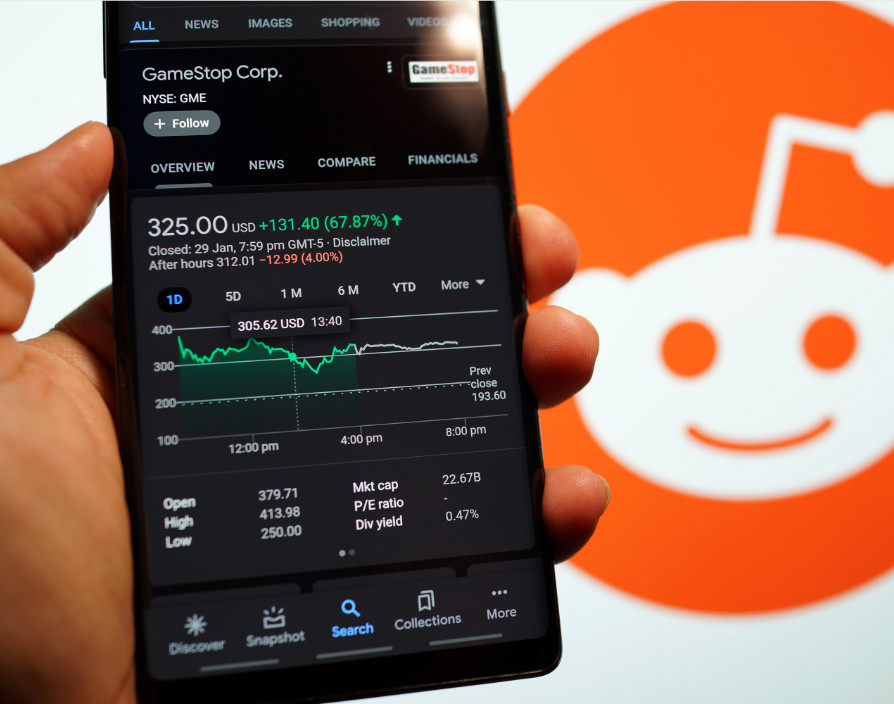Shares in GameStop Corp doubled on February 25, the latest news in the saga that has gripped the financial world since the beginning of the year.
Meanwhile, as many amateur investors report major losses in the Gamestop Reddit rally, one particular user has been named in a class action lawsuit for dishing out financial advice over social media.
Youtuber and popular contributor Keith Gill, as well as his former employer, are facing a lawsuit for his contribution in the inflation of the stock.
In late January and early February, Gamestop stock surged 700% as small traders joined forces on Reddit to ‘fight Wall Street giants.’
What later became a ‘memestock’ started as financial advice on the WallStreetBets subreddit, as users posted about driving up the stock’s price to ‘fight’ hedge funds shorting it.
The suit brings up an interesting issue for investment networks in the UK: Can investments networks face similar consequences for marketing to investors on social media?
The class action lawsuit
Redditor Keith Gill, who goes by the alias RoaringKitty on YouTube, has been named in a class action lawsuit by users reporting losses in the Gamestop movement.
The suit, filed by US law firm Hagens Berman, also names his former employer, MML Investors Services, and Massachusetts Mutual Life Insurance Company.
Gill quit his position as financial advisor at MML soon after posting a screenshot showing that his GameStop $53,000 investment had made him $48 million.
“The idea that I used social media to promote GameStop stock to unwitting investors is preposterous,” he says.
Gill is accused of manipulating the market after posting his stock tips on his Youtube channel as well as the Reddit WallStreetBets sub. The suit claims he hid his sophisticated financial background in order to dupe amateur investors on the two sites.
“He caused enormous losses not only to those who bought option contracts, but also to those who fell for Gill’s act and bought GameStop stock during the market frenzy at greatly inflated prices,” the suit reads.
While the GameStop frenzy brought major financial gains to some Reddit users and hedge funds like Senvest Management in New York, who made almost $700 million in trading, others were less fortunate.
Amateur investors like Tori Barry of Wales told the Financial Times that the reason she invested was reading a tweet by Elon Musk promoting the stock.
We are not big players. We haven’t lost millions, but for us that is rent for the month, it is bills. I don’t know how we’ll recover. […] I rate Elon Musk quite highly and trusted him. This tweet was a big influence. With his support it appeared that the retail traders would win, she said.
Musk caused a surge in stock prices after tweeting ‘Gamestonk!!,’ while other billionaires joined in, without legal consequences as of yet.
I got to say I LOVE LOVE what is going on with #wallstreetbets. All of those years of High Frequency Traders front running retail traders, now speed and density of information and retail trading is giving the little guy an edge. Even my 11 yr old traded w them and made $ (sic), Mark Cuban tweeted.
Why this matters to UK investment networks
While this US-based drama doesn’t directly translate to the UK, there are some very important lessons to learn. In the UK, the Financial Conduct Authority (FCA) has legislation regarding marketing to non-professional investors on social media or otherwise, and networks and individuals that fail to comply may face serious consequences.
The regulation outlines rules on promotional activity that may leads to the purchase of shares in a company.
While many believe that if you’re not ‘arranging’ a deal you’re in the clear, this is not the case. Whenever you’re communicating with investors outside the Professional class, you should have a regulated entity sign off on any financial promotion to ensure it’s ‘clear, fair and not misleading.’.
It is also prudent to ensure you know who you are communicating with by having all of your investors sign a self-certification statement that ensures they understand the risks associated to investing.
The Financial Services and Markets Act 2000 (FSMA) covers all promotional activity to investors including invitations to pitching events, email or social media posts or posts on a network’s website.
Networks looking for regulatory cover should work with partners, like Envestors that can provide Introducer or Appointed Representative status, allowing them to make introductions to companies safely and within the limits of FCA regulation.
By ensuring you are on the right side of FCA regulation you can avoid the risk of falling fowl of the rules which is a criminal offence that can result in a hefty fine and liability for damages.
“
Share via:









































